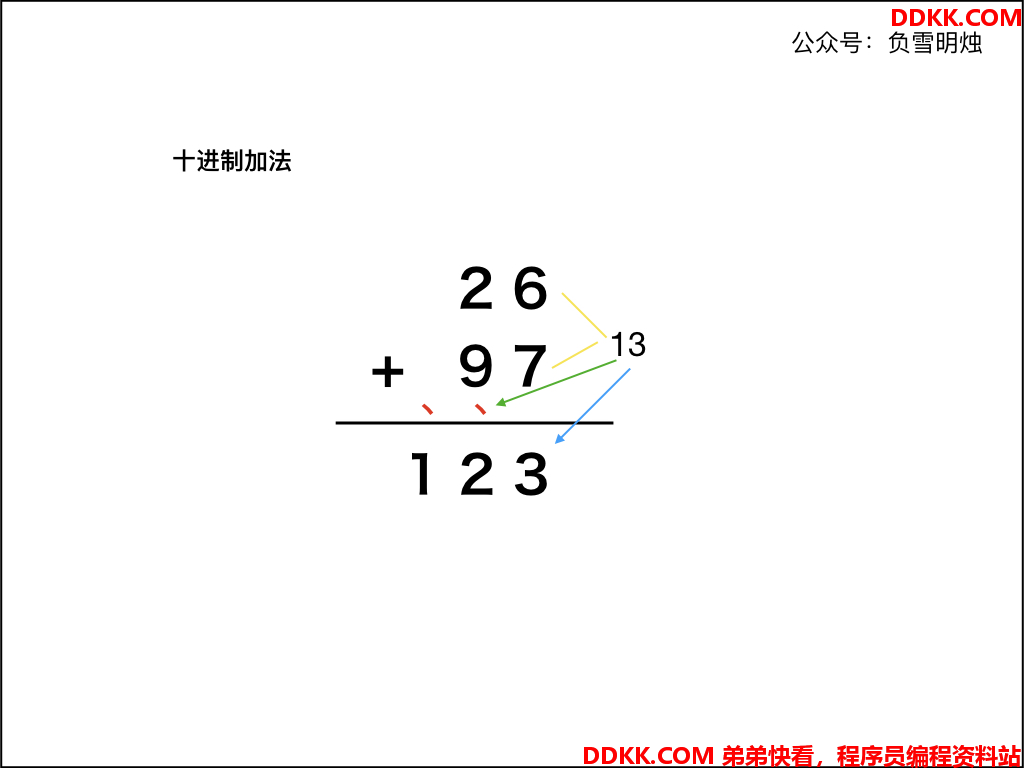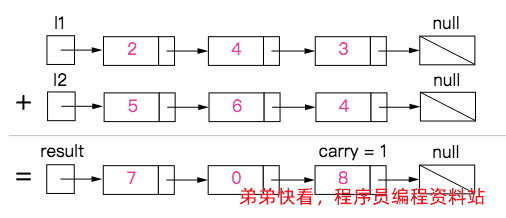两数相加,链表,求加法,题解,leetcode, 力扣,python, c++, java
题目地址:https://leetcode.com/problems/add-two-numbers/description/
题目描述
Youare given two non-empty linked lists representing two non-negative integers. The digits are stored in reverse order and each of their nodes contain a single digit. Add the two numbers and return it as a linked list.
Youmay assume the two numbers do not contain any leading zero, except the number 0 itself.
Example:
Input: (2 -> 4 -> 3) + (5 -> 6 -> 4)
Output: 7 -> 0 -> 8
Explanation: 342 + 465 = 807.
题目大意
有两个链表,分别是逆序了的十进制数字。现在要求两个十位数字的和,要求返回的结果也是链表。
解题方法
十进制加法
我们先回顾一下十进制加法的计算过程:

使用「竖式」计算十进制的加法的方式:
1、 两个「加数」的右端对齐;
2、 从最右侧开始,依次计算对应的两位数字的和如果和大于等于10,则把和的个位数字计入结果,并向前面进位;
3、 依次向左计算对应位置两位数字的和,如果有进位需要加上进位如果和大于等于10,仍然把和的个位数字计入结果,并向前面进位;
4、 当两个「加数」的每个位置都计算完成,如果最后仍有进位,需要把进位数字保留到计算结果中;
链表相加
本题中的两个链表表示的数字是个位在前,高位在后。
所以,我们可以从两个链表的开头开始同时向后遍历,模拟上面加法的过程。图源open in new window。
 可以用两种做法:循环 + 递归。
可以用两种做法:循环 + 递归。
在实现中需要注意的有:
1、 不可以把链表先转化成int型数字再求和,因为可能溢出;
2、 两个「加数」的字符串长度可能不同;
3、 在最后,如果进位carry不为0,那么最后需要计算进位;
方法一:循环
循环的思想比较朴素,就是两个指针同时遍历两个链表每个节点并相加的过程。
代码中的巧妙之处:
1、while(i>=0||j>=0||carry!=0)含义:
1、 链表a和b只要有一个没遍历完,那么就继续遍历;
2、 如果链表a和b都遍历完了,但是最后留下的进位carry!=0,那么需要把进位也保留到结果中;
2、 取a和b当前位置数字的时候,如果链表a或b已经遍历完了(即i<=0或者j<=0),则认为a和b的对应位置是0;
Java 代码如下:
class Solution {
public ListNode addTwoNumbers(ListNode l1, ListNode l2) {
ListNode dummy = new ListNode(0);
ListNode cur = dummy;
int carry = 0;
while (l1 != null || l2 != null || carry != 0) {
int i1 = l1 != null ? l1.val : 0;
int i2 = l2 != null ? l2.val : 0;
int add = i1 + i2 + carry;
carry = add >= 10 ? 1 : 0;
add = add >= 10 ? add - 10 : add;
cur.next = new ListNode(add);
cur = cur.next;
if (l1 != null)
l1 = l1.next;
if (l2 != null)
l2 = l2.next;
}
return dummy.next;
}
}
1 2 3 4 5 6 7 8 9 10 11 12 13 14 15 16 17 18 19 20 21
C++代码如下:
class Solution {
public:
ListNode* addTwoNumbers(ListNode* l1, ListNode* l2) {
ListNode* dummy = new ListNode(0);
ListNode* cur = dummy;
int carry = 0;
while (l1 || l2 || carry) {
int i1 = l1 ? l1->val : 0;
int i2 = l2 ? l2->val : 0;
int add = i1 + i2 + carry;
carry = add >= 10 ? 1 : 0;
add = add >= 10 ? add - 10 : add;
cur->next = new ListNode(add);
cur = cur->next;
if (l1)
l1 = l1->next;
if (l2)
l2 = l2->next;
}
return dummy->next;
}
};
1 2 3 4 5 6 7 8 9 10 11 12 13 14 15 16 17 18 19 20 21 22
Python 代码如下:
class Solution(object):
def addTwoNumbers(self, l1, l2):
dummy = ListNode(0)
cur = dummy
carry = 0
while l1 or l2 or carry:
i1 = l1.val if l1 else 0
i2 = l2.val if l2 else 0
add = i1 + i2 + carry
carry = 1 if add >= 10 else 0
add = add - 10 if add >= 10 else add
cur.next = ListNode(add)
cur = cur.next
if l1:
l1 = l1.next
if l2:
l2 = l2.next
return dummy.next
1 2 3 4 5 6 7 8 9 10 11 12 13 14 15 16 17 18
复杂度分析:
- 时间复杂度:O(max(M,N)),M 和 N 分别是链表 a 和 b 的长度;
- 空间复杂度:O(1),只使用了常数的空间。
方法二:递归
递归解法非常巧妙。
做递归题目一定要牢记「递归函数的定义」。
递归函数定义:addTwoNumbers 表示将两个链表 l1 和 l2 相加得到的新链表; 递归终止条件:如果 l1 和 l2 有一个为空,则返回另外一个。 递归函数内容:
- 把两个链表节点的值相加(结果记为 add )。把 add 模 10 作为当前的链表节点的值。
- 把两个链表的 next 节点相加。(注意:如果当前相加的结果 add>`=10,需要把 next 节点相加得到的结果 + 1。)
递归解法妙在天然地处理好了两个链表不一样长、最终相加结果有进位的情况。
Java 代码如下:
class Solution {
public ListNode addTwoNumbers(ListNode l1, ListNode l2) {
if (l1 == null)
return l2;
if (l2 == null)
return l1;
int add = l1.val + l2.val;
ListNode res = new ListNode(add % 10);
res.next = addTwoNumbers(l1.next, l2.next);
if (add >= 10)
res.next = addTwoNumbers(res.next, new ListNode(1));
return res;
}
}
1 2 3 4 5 6 7 8 9 10 11 12 13 14
C++代码如下:
class Solution {
public:
ListNode* addTwoNumbers(ListNode* l1, ListNode* l2) {
if (!l1) return l2;
if (!l2) return l1;
int target = l1->val + l2->val;
ListNode* res = new ListNode(target % 10);
res->next = addTwoNumbers(l1->next, l2->next);
if (target >= 10)
res->next = addTwoNumbers(res->next, new ListNode(1));
delete l1, l2;
return res;
}
};
1 2 3 4 5 6 7 8 9 10 11 12 13 14
Python 代码如下:
class Solution(object):
def addTwoNumbers(self, l1, l2):
if not l1:
return l2
if not l2:
return l1
add = l1.val + l2.val
res = ListNode(add % 10)
res.next = self.addTwoNumbers(l1.next, l2.next)
if add >= 10:
res.next = self.addTwoNumbers(res.next, ListNode(1))
return res
1 2 3 4 5 6 7 8 9 10 11 12
类似题目
看完本题解本题,你可以解决以下题目:
- [2. 两数相加open in new window][2. _open in new window]
- 445. 两数相加 IIopen in new window
- 67. 二进制求和open in new window
- 415. 字符串相加open in new window
- 66. 加一open in new window
- 989. 数组形式的整数加法open in new window
总结
1、 「加法」系列题目都不难,其实就是「列竖式」模拟法」
2、 需要注意的是while循环结束条件,注意遍历两个「加数」不要越界,以及进位;
DDKK.COM 弟弟快看-教程,程序员编程资料站,版权归原作者所有
本文经作者:负雪明烛 授权发布,任何组织或个人未经作者授权不得转发